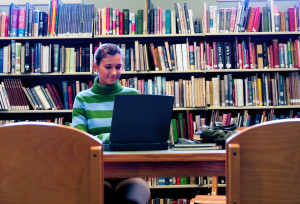Bookshare expands its accessible ebook collection for higher education through partnerships with publishers and university presses
During a recent discussion on AERNet (Association for Education and Rehabilitation of the Blind and Visually Impaired), questions arose about Bookshare’s policies on converting books for higher education. Here is the explanation from Jim Fruchterman, CEO of Benetech, that we felt was important to share with the larger Bookshare community.
Bookshare is a library focused on books that can be shared. Our dream is that once a book has been digitized, nobody else will have to do scanning work again. We need to do that within the bounds of the law to protect our users and the many great people and organizations that voluntarily help us achieve this common dream.
We deal almost exclusively in books. Other than a long-standing partnership with NFB Newsline where we automatically get daily newspapers and a few magazines, we don’t add journals or articles to our collection. We don’t do partial books or course-packs. A good rule of thumb is if it’s a modern book, it should have an ISBN in order to be added to our collection. Our website has a list of what we don’t take, but it basically follows our strong interest in complete books.
Bookshare does not have any specific funding for supporting higher education students. As part of our award from the Office of Special Education Programs, U.S. Department of Education, which is funded by IDEA (Individuals with Disabilities Education Act) K-12 money, we agreed to serve all higher education students for free. Our focus on higher education collection development is twofold. First, we work with publishers to provide us their ebooks for free (over 500 publishers have partnered with us, including dozens of university presses and key higher education publishers such as Wiley and Springer). Second, we have a Bookshare University Partners Program for post-secondary institutions to share complete books that have been proofread and scanned so that they become available. In general, it’s the obligation of the higher education institution to acquire accessible versions for students (by finding them in Bookshare, Learning Ally, or Accesstext Network, getting them from the publisher, or by scanning them).
We only accept ebook versions in usable digital formats, as opposed to scanned versions, directly from the publisher or the author, because they clearly have the authority to agree to our publisher or author agreements and can supply formats that we can easily convert into DAISY (typically EPUB, but also Word). The main reason for this is to protect the people submitting content to us, because someone who uploads a publisher-supplied ebook to Bookshare would probably be violating some other license or agreement that came with that title.
We welcome the opportunity to form a partnership with your university press for ebooks, your faculty members for their published books (in digital form), or with your school to acquire complete books that have been scanned and proofread to add to our collection and make available at no cost through our OSEP-funded services.
Benetech is a Silicon Valley technology nonprofit that provides software tools and services to address pressing social needs. Each of its program areas—Global Literacy, Human Rights, the Environment, and Benetech Labs—offers the greatest social impact on funds invested. Social entrepreneur and MacArthur Fellow Jim Fruchterman created Benetech in 2000 and leads the organization as its CEO.

Be First to Comment